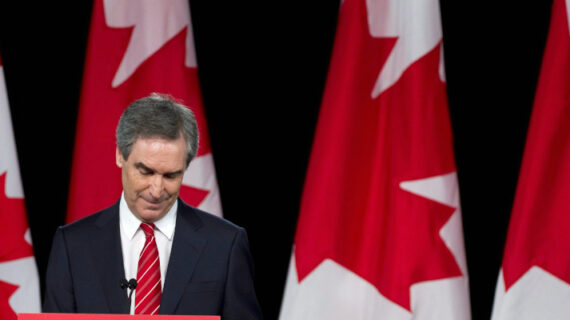Opining recently on a Canadian political podcast, one of the pundits — a former Liberal power broker — declared it odd that the Progressive Conservative leader of Nova Scotia, Tim Houston, was running in the upcoming provincial election with health care as a priority policy issue.
By not conforming to what has become the caricature paradigm of conservatives in Canada, Houston was clearly setting the commentariat back on its heels.
As this particular pundit paraphrased Houston’s platform, the PC leader is saying: “Our health system sucks. Our hospitals suck. And we need to put money into that even if it means running a higher deficit.” And then, he summarized this wacky PC platform, thusly: “That’s a really interesting tack for a conservative party to take. To try to make themselves the health care party.”
Say what?!
MORE SIGNAL. LESS NOISE. THE HUB NEWSLETTER.
Canadian political discourse has become so stilted and steeped in ignorance in recent years that it is blithely accepted that no one who is conservative-minded — with a lowercase or capital “C” — could prioritize an issue like health care, at all.
The accepted wisdom is that compassion and social issues are the exclusive domain of partisan liberals and other left-leaning parties; that the conservative DNA rejects such matters in favour of tax cuts for the wealthy. Or slashing social benefits. A nasty and brutish lot, they are.
And it is precisely this sort of brittle and simplistic thinking that has landed the Canadian health-care system in its current mess. In recent years in particular, conservatives have been branded as heartless, rapacious capitalists who value wealth accumulation above all else. It is the “progressives,” who preserve the humanity and decency in our society.
Life, and politics, are just not that binary.
“Conservative” has become synonymous with “un-Canadian” and to have the temerity to question progressive truths, even in the spirit of the public interest, is “un-Canadian.” To disagree and, god forbid, possibly hurt someone’s feelings, is “un-Canadian.”
And conservative-minded Canadians, it would seem, are seen by many compatriots to be, well, un-Canadian. Apparently, the right-of-centre species is devoid of empathy or any real sense of social responsibility.
This sort of next level smugness has become deeply entrenched in the last six years. And it is a profoundly alarming development that threatens civil discourse and democratic fundamentals. Like exercising the right to free speech.
Canadians tend to self-assure with false bromides about how much more compassionate we are than Americans. We remind ourselves, constantly — as we did recently until COVID ravaged us as well — that we are just so much, well, better, than they are. And, perhaps we are.
But, Tim Houston is right. We do have a problem. A big one.
Our health-care system in Canada really does suck. And even a blind person can see that we are throwing money into a bottomless sinkhole, financing a very broken model.
Canada’s universal health care system was conceived more than 60 years ago, when the Keynesian laws of finance prevailed. Galloping economic growth matched by wildly increasing public spending year-over-year supported bloated government infrastructures and services. The economies of Europe and Japan were ruined and half of continental Europe was communist. North America was an economic superpower. The world really was its oyster and captive market.
In the ensuing decades a lot has changed. The unstoppable growth has seized up. We are having to process the idea that many things are finite, including natural resources and the planet’s ability to sustain our insatiable plunder. Governments have ballooned with no commensurate productivity.
(And then there’s the resurgence of Europe and Japan since the late ’70s, and the collapse of European communism in favour of variations on the market economy. And the rise of China.)
Yet we are stuck in the last century, fixated on this obsolete model of spending more, changing nothing and criticizing no one.
Having been a long-time client of Canadian health care, in Toronto, specifically, and now covered by state-funded universal health care in Israel, in Tel Aviv, specifically, I feel qualified to opine and compare.
And the overarching observation is that Canadian health-care systems have a lot to learn from Israel.
Interestingly, so much of the reform of the Israeli health care system in recent decades has been overseen and driven by right wing governments. I expect that they are loath, as are Canadian politicos, to consider harming the sacred cow of universal health care. Votes aside, a healthy nation is happier and more productive. There is plenty of evidence and data to support that self-evident observation.
Until the late ’80s, Israel was a borderline third world state: a socialist, agrarian economy with triple digit hyper-inflation. Then, as now, approximately 40 percent of the state budget was allocated to security, a heavy burden that Canada has, blessedly, never known.
Israel today is a dramatically reinvented nation with a flourishing innovation-based economy. It didn’t just happen spontaneously. Such an extreme makeover is planned.
Listings of Israeli companies on NASDAQ, the secondary New York stock market, are third in number, after China and the U.S. That statistic is insane. Israel is a country with a population of nine million people and previous few natural resources. Virtually all Israeli NASDAQ companies are in biotech, pharma, cyber security, medical tech.
And, in 2020, Israel, which so many still associate with oranges and blooming deserts, surpassed Canada in per capita GDP. World Bank data reports Israeli GDP per capita last year at US$43,610, with Canada close behind at US$43,421. Simply mind-blowing.
And, along with a reinvention of the national economy, Israel has kept apace with much-needed innovation in the health-care sector. For Canada, there are four significant factors to take-away from this brief comparative study.
Competition
Health care in Israel is state funded and comprehensive. By law, each citizen is required to register with one of four competing health care providers.
Yup, there is competition in the state funded system. And this transforms the health culture. And leads to greater efficiencies.
Each HMO has a niche. I live in Tel Aviv, which is to Israel what downtown Toronto is to Canada. Most Tel Avivians are with Maaccabi, reputed to support a more “progressive” health culture.
Another HMO is the largest and oldest and has a presence in every kibbutz and small town throughout the country. Another one caters to more religious clientele. This competition encourages niche specialties, focused and holistic customer care and seems to result in doctors valuing patients and not treating them like chattel. Or cattle.
Digitization
For more than 20 years now, the Israeli health care system has been fully digitized. What does that mean? It means that all your health information is stored digitally and whenever you present at a doctor’s office, the hospital, an after hours clinic, the staff have instant access to your full medical history. So you don’t waste all that time trying to remember medications, last time you had your tetanus shot, never mind all the basics, like name, age, address.
The time wasted on such redundant information gathering in Canada, that is siloed and not centralized, must be astronomical. Wasted time is wasted money on administration that should and could be diverted to patient care and services.
Everything, I mean everything, is done online. Appointment bookings, even with specialists. Tests. Prescription renewals. You name it. Your kid breaks a leg after hours? You don’t clutter the emergency room at a hospital. Instead, you take her to the nearest after-hours clinic, where doctors and nurses can X-ray and treat things like broken limbs, sudden strep onset, even bronchitis and pneumonia. Pretty much everything but surgery. Garden variety wounds and illnesses should not funnel into hospitals automatically. Again, a colossal waste of resources.
No fax machines. No paper slips for the drugstore. No waiting for hours for a prescription to be filled. No speed-dialing for hours, days, to make a simple appointment with a doctor. Etc. Etc.
Oh. And physicians actually use email.
Preventive medicine
The annual check up is a very different ritual in Israel than Canada, primarily because of the intense focus on preventive medicine.
I haven’t seen a reflex hammer in 8 years, since I arrived here, or any of the other prehistoric but routine tools used and tests carried out by my GP in Toronto. Apparently, there is ample clinical evidence supporting the Israeli approach: that actually speaking with the patient and understanding them as a person, including their lives, allows the physician to tailor care so that it is more effective. Blood tests, for example, are requisitioned on the basis of this yearly tête-à-tête.
In my experience, routine blood testing done in Israel is simply not on the menu in Canada unless one is prepared to fork out thousands of dollars annually. This testing is age-based, comprehensive and modified, as necessary, to address individual issues. Blood tests are far less costly, in the short and long runs, in detecting early signs of medical problems and treating them before they become acute. Just one example among many of medical care that is patient oriented, more efficient and effective.
Private options
As existed in Canada until the Mulroney government amended the Canada Health Act in 1988, Israelis have the option of using the public state-funded system or going private. Doctors, too, can split their practices between public and private systems. It’s a critical element of a well-functioning health-care system: allowing physicians to practice in different environments which, ultimately, enhances their sense of autonomy and engagement and, again, quality and efficiency of patient care.
Every Western country offers state care with a private option as well. The pros and cons are the subject of another essay but the net benefits are pretty obvious.
And, for what it’s worth, for my first few years in Israel I had the privilege of being covered on a gold-plated diplomat’s plan. For the last five I’ve been on the proletarian public option. Truth? Private, in my experience, is no better. One of the main reasons for it to continue, in addition to providing options, is to service the large expat communities here: journalists, NGOs, diplomats, etc.
But, more importantly, it acts as a pressure valve, allowing professionals greater independence. Unlike in Canada, they are not fully controlled, financially, by the government. So, if they choose to engage in a split practice, for whatever reason, they are free to do so. More than ample evidence and studies confirm that such freedom facilitates more robust research environments and holistic treatment of patients. Like it or not, the concept of risk and reward motivates even medical professionals.
And then there are the numbers. Most recent OECD stats make clear that the cost of health care in Canada is almost double that in Israel. On a per capita basis health care spending is US$5,370, compared to US$2,903 in Israel.
The share of compulsory government spending in Canada? US$3,768. In Israel? US$1,881. A health care economist I am not but I’m taking a wild guess that such significant spending gaps have a lot to do with systemic inefficiencies.
It’s not a right wing-left wing thing, not by a long shot. The system in Canada is broken and in desperate need of a radical re-think.
Canadians really ought to hold themselves to a higher standard. “It’s good enough” or “look how much better and nicer we are than America” just isn’t good enough. At least, it shouldn’t be.
Houston is right. We do have a problem.




